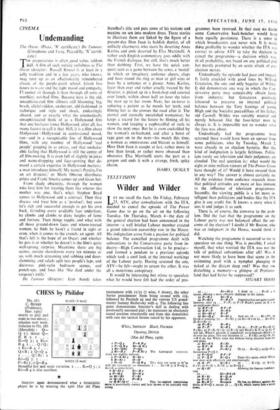TELEVISION
Wilder and Wilder LET me recall the facts. On Friday, February 25, ATV, after consultations with the ITA, decided to cancel the episode of The Power Game due to gia on the air on the following Tuesday. On Thursday, March 4—the date of the general election'had been announced in the interim—a well briefed Labour Member created a grand television censorihip row in the House. His indignation arose from a passion for political balance. The cancelled programme dealt with subventions to the Conservative party from in- dustry—Bligh Construction Ltd, to be precise— and formed a pendant to a previous episode which took a cool look at the internal workings of the Labour party. Having screened the one, ATV—he felt—ought to screen the other. It was all a monstrous conspiracy.
It would be interesting but otiose to speculate what he would have felt had the order of pro-
grammes been reversed. In that Case, nO doubt some Conservative back-bencher would have been equally passionate. There is a sense in which broadcasters can never win. It is much tfidtv profitable to wonder whether the ITA was correct to advise ATV to take the decision to cancel the programme—a decision which was, id all probability, not based on any political plot but merely prompted by an acute attack of pre- election nerves.
Undoubtedly the episode had pace and impact. It fairly crackled with good lines by Wilfred Greatorex, the one and only begetter of Wilder. if did demonstrate one way in which the Con- servative party may conceivably obtain funds from industry; but Greatorex positively laboured to preserve an internal political balance between the Tory leanings of young Bligh and the Socialist peccadilloes of his father, old Caswell. Wilder was suitably neutral and merely behaved like the four-letter man he always is. It is impossible not to wonder what the fuss was about.
Undoubtedly had the programme been screened there would have been an uproar from some politicians, who by Tuesday, March 2, were already in an election hysteria. But this kind of indignation is largely fictitious. Politic- ians rarely see television and their judgments are clouded. The real question is: what would the eight or nine million viewers of The Power Game have thought of it? Would it have swayed them in any way? The answer is almost certainly no. All the evidence from audience research -shows that political attitudes are more or less immune to the influence of television programmes. Secondly, the viewing public is a lot more in- telligent than politicians and bodies like the ITA give it any credit for. It knows a story when it sees it and judges it as such.
. There is, of course, the converse to the prob- lem. Did the fact that the programme on the Labour party was not balanced affect the out- come of the election? I doubt if Mr Boston, who was so indignant in the House, would think it did.
Watching the programme it occurred to me to speculate on one thing. Was is possible, I asked myself, that what worried the ITA was not the talk of political subventions after all? Was it not more likely, to have been that scene in the swimming pool with a nymphet plunging in naked at the distant deep end? Was that too disturbing a memory—a glimpse of Profumo- land that had better be suppressed?
STUART HOOD






























 Previous page
Previous page